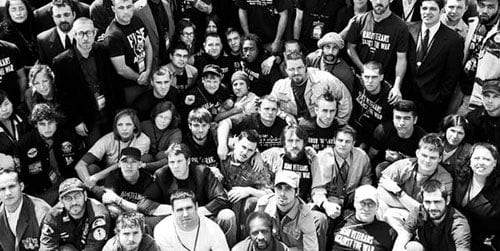
Doing stuff like this my way of saying, “I’m sorry,” you know, to the Iraqi people.
— Zollie Goodman
“These are soldiers that are telling their stories,” says Geoff Millard. More specifically, these are Iraq war veterans, and they’re telling their stories in an effort to stop the wars in Iraq and Afghanistan — and other, as yet unimagined wars. As This Is Where We Take Our Stand opens, Millard and other members of Iraq War Veterans Against the War (IVAW) are organizing a forum for some 250 US Iraq and Afghanistan veterans and active duty soldiers, as well as some family members. They mean to remember what has happened, to speak to each other and also, publicly, with the hope that the stories might raise awareness of what happens in the war in a wider population that has, for the most part, been able to ignore it.
Scheduled to begin on 13 March of 2008, the fifth anniversary of the invasion of Iraq, the event is inspired by the 1971 Winter Soldier Investigation, some of which is assembled in the film Winter Soldier, during which US veterans of the war in Vietnam described their experiences, what they had seen and done in Southeast Asia. As This is Where We Take Our Stand includes brief moments from the first film (“They were inferior to us, we were Americans, we were the civilized people”), the similarities between the two events, and the films about them, are striking. In both, soldiers sit at tables to speak, their listeners in folding chairs, attentive and respectful. In both, journalists ask questions and point their cameras, and in both, some stories are illustrated by amateur photos, “home movies,” and occasional news footage. If such visual evidence can’t “verify” all stories — a concern voiced more than once by reporters and protestors at the event — it does support accounts that something went wrong. The tragedy is that this “wrong” is how wars must work.This much is revealed by both hearings: where the presentations are formal and also painful, as soldiers’ voices catch or the film cuts to audience members reacting, their faces somber or tearful. The images from the wars are heartbreaking, whether they show the younger, more naïve versions of the soldiers now speaking, or the experiences they’re describing, the effects of violence.
The similarities between the films make clear a couple of disturbing points. For one thing, for all the advances in technologies since the Vietnam war, the ways that war is waged haven’t changed much. Young soldiers — men and women — are trained and sent out into extraordinary situations, and that training must involve the derogation of the enemy: otherwise, it’s hard, if not impossible, to shoot at another human being. For another thing, the apparent lessons of the war in Vietnam seem lost: the same essential assertions hold, that the US troops are following orders, that abuses and attitudes filter throughout the ranks, that military occupations of other countries, no matter how they start, lead to local resentments and resistance: occupiers become adversaries. The film, following from the forum, doesn’t blame people so much as it considers how they came to their wartime selves, how they came to see others as such, and how those others might be like them — and, importantly, like US civilians,
Such lessons remain crucial, even as specific wars “wind down.” And so This Is Where We Take Our Stand — opening 1 February at New York’s IFC Center and airing on PBS — is crucial too, as it helps us to realize such difficult lessons, again. Most obviously, these lessons are articulated in individual stories, harrowing and remorseful. These range from accounts of killings to descriptions of the kinds of racist language used to redefine and demean the “other,” including civilians, who look “just like” the enemy. And they include memories of shooting at old people unable who are driving badly, the deaths of children, the anger voiced by people trying to protect their homes and families.
Jason Washburn remembers a moment when he saw himself as one of these citizens might have seen him: “I had come to realize,” he says, that I was on the bullies’ team.” When he and Selena Coppa and Millard signed up to go to war, they had other self-images in mind: they were fighting for their country, they were pursuing a family tradition, or they were seeking vengeance against the aggressors of 9/11.Once in country, however, self-images shift. And such shifts can be lasting. As Clifton Hicks remembers, “It just doesn’t pay to give a shit. You’ve gotta be a callous fucker over there to live. You’ve gotta be a callous fucker back here to live with what you lived through.” But if the soldiers testifying at Winter Soldier 2008 mean to “bring the reality of the war home, here,” as one man asserts, they also take responsibility for what they’ve done and witnessed. As the US continues to fight wars away from home, it’s too easy for the civilian population to forget, even as it’s happening. This population can remain unaware that Iraq war veterans commit suicide (10,000 as of 2008) and that soldiers turn frustrated and angry that their experiences are so isolating.
In telling their stories, Millard says, they don’t judge or even ask their listeners to judge, what’s gone wrong. They hope only that they can stop this war and at least caution against a next war, to end the repetition and the lessons unlearned.

![Call for Papers: All Things Reconsidered [MUSIC] May-August 2024](https://www.popmatters.com/wp-content/uploads/2024/04/all-things-reconsidered-call-music-may-2024-720x380.jpg)



